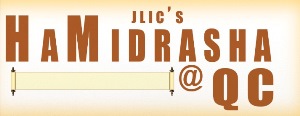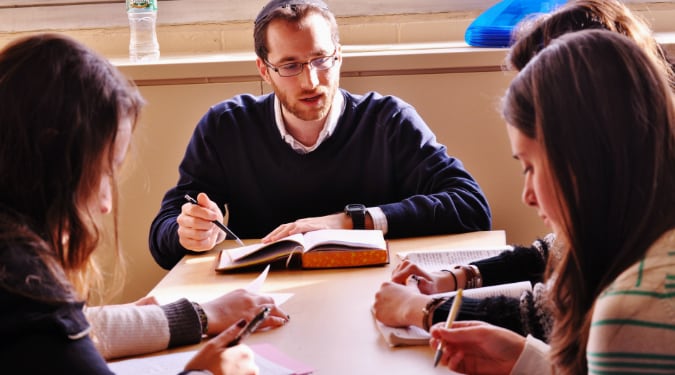 When Rabbi Robby and Shoshana Charnoff arrived at Queens College two years ago as the inaugural Torah Educators of the Orthodox Union’s Seif Jewish Learning Initiative on Campus (JLIC) program at Queens, they emphasized their goal of “transforming a commuter campus into a Queens College Jewish Community.”
When Rabbi Robby and Shoshana Charnoff arrived at Queens College two years ago as the inaugural Torah Educators of the Orthodox Union’s Seif Jewish Learning Initiative on Campus (JLIC) program at Queens, they emphasized their goal of “transforming a commuter campus into a Queens College Jewish Community.”
The Charnoffs serve as Torah educators, role models and community organizers on campus, which is no small feat for a constituency of almost 1,000 Orthodox Jewish students.
After their first few months on campus, Rabbi Charnoff reflected, “We are re-envisioning Jewish life here at Queens College—the student leadership is here, the passion is here, the Hillel staff is here, and with JLIC here, Queens College will be a massive force on Jewish campus life within the next few years.”
True to that statement, the influence of JLIC has positively permeated the campus.

Photo credit: Shoshana Charnoff
Within their first year, the Charnoffs noticed a growing trend of young women wishing to create JLIC learning groups to continue their studies. Throughout the week small groups of female chaburot kept organizing, creating an almost accidental midrasha. “Male students have many yeshivas in the surrounding neighborhoods of Kew Gardens Hills and Forest Hills, to schedule times to learn, but women have far fewer choices,” the Charnoffs said. Realizing they could fill a void for significant Torah learning for their female students, Rabbi Robby and Shoshana set off to formalize a full-fledged midrasha for women on campus.
Beginning Wednesday, September 3, the Charnoffs will launch JLIC’s HaMidrasha@QC, an on-campus intensive beit midrash program for women with a focus on developing central concepts and philosophies in Judaism, as well as facilitating in-depth, text-based chevruta learning. Comprehensive perspectives on chumash, navi, halacha, and hashkafa will be taught in chevrutah and chaburah style over the course of each three-year cycle.
Designed by the Charnoffs and a delegation of female student leadership, the entire program takes place during one class period per day (3:00-4:50 p.m. Monday through Thursday) to ensure that students can easily work their class schedules around the program. Rabbi Charnoff noted that this time is both the longest class slot and the slot that can be most easily avoided by taking similar classes at a different time. The midrasha is also arranged so that some of the topics are taught only on Monday/Wednesday or Tuesday/Thursday should a student have limited time available during the week.
“Coming back from Israel, I was always looking for consistent learning opportunities—and coming from New York, yes, learning does exist for women but I hadn’t found the same beit midrash style that fostered independent learning as I had in the past,” shared Rikki Adler of West Hempstead, who studied at Sha’alvim for Women after graduating from Yeshiva University High School for Girls. Now a senior at Queens College, Rikki was part of the student leadership team that worked to create HaMidrasha@QC with the Charnoffs.
She added, “Beyond the learning aspect, it’s exciting to regularly be with a group of women who also prioritize Torah learning, and who are willing and excited to take the time out of their busy schedules to learn. HaMidrasha is something many girls are looking for upon returning from Israel and I’m happy I’m able to be a part of it.”

Photo credit: Shoshana Charnoff
Without any prior advertisement, 24 students have already registered for the program and committed to participating.
“I think it’s a fantastic idea because it’s very hard to continue learning when on secular campus and balance coursework with spiritual growth,” noted Jenny Kormin of Merrick, NY, a junior who studied at Tiferet after graduating from Hebrew Academy of Nassau County. “As time goes on it gets a lot harder to continue learning and there’s something to say about having a constant midrasha program on campus every day. It will be super helpful for girls struggling in these areas.”
As the OU’s JLIC program is in partnership with Hillel, the Charnoffs are a full part of the Queens College Hillel staff. They credit Hillel executive director Uri Cohen for understanding the need for the midrasha at Queens College and for securing a room on campus exclusively for the program’s use as a women’s beit midrash.
A year and half in development, the Charnoffs knew that every aspect of HaMidrasha@QC had to be decided in collaboration with students in order to fulfill its purpose. Two teams of eight women who were frequent JLIC participants, all ranging in observance on the Orthodox spectrum, discussed every detail—when to learn, what to learn, which texts to include, should there be a registration fee, who should teach, how long should the program span, what are the goals of the program, etc.
“We came from different high schools and seminaries, with different styles of learning, but at end of the day we handled each decision well, we talked it out and Rabbi Charnoff would simply guide conversation,” Jenny Kormin noted. “It was very interesting to actually choose what would be taught, as I was always on the learning side. Suddenly we found ourselves choosing what should be taught coming into the program. It was humbling and exciting being able to contribute what I thought girls should learn, and what they will carry with them the rest of their lives.”

Photo credit: Shoshana Charnoff
In order to accommodate the various student interests within the potential midrasha, “We hammered out details by talking through them, and working through every aspect together as a team,” said Rikki Adler. “There was a mutual respect between all of us [students and the Charnoffs] and therefore when we would disagree, we felt safe challenging each other since we knew they were listening. That’s how you build a diverse program. HaMidrasha isn’t simply a program created by one person, but designed by a large group of diverse individuals focused on the bigger picture.”
In the end, the group decided that over a three-year period, HaMidrasha@QC would offer information women need to lead a thoughtful, knowledgeable, Torah-oriented life, both practically and philosophically; the skills women need to develop with core Jewish texts to continue learning over a lifetime; familiarity with key texts that women will need to consistently reference in daily life and learning; and a framework for practically meeting the challenges of balancing family, career, spirituality and Torah learning for life.
Rabbi Charnoff will be teaching the majority the midrasha classes for its initial year, allowing Shoshana to focus her energies on other student programming during that slot each day. Still, Shoshana will be hands-on in the midrasha program, assisting with chevruta learning and speaking with students about concepts of Jewish living and the challenges posed to women.

“One of the main roles I see for myself is to be a spokesperson of what a woman could be,” said Shoshana. “Living as Torah-observant Jews in the modern world, we must be open about challenges. We need to talk about how life transitions affect us individually and spiritually. We went to seminaries defined by Torah learning, and following seminary we had time to learn sefarim. But how do you feel when, newly-married, you find less free time to open a book? How do practical erev Shabbat preparations connect to spiritual preparations? How does one maintain a spiritual lifestyle in the throes of life—especially with a husband, career, and family? These are really hard questions that don’t have simple answers.”
She added, “It’s important to discuss the bigger picture with students. Torah learned in the beit midrash shouldn’t be left there. It’s a living Torah, and we’re all a work in progress. It’s all about working to be the best ovdei Hashem we can be at every stage of life.”
For further information, contact the Charnoffs at jlicrabbi@qchillel.org or scharnoff@qchillel.org. To register for HaMidrasha@QC, visit www.jlicqueens.org.
The words of this author reflect his/her own opinions and do not necessarily represent the official position of the Orthodox Union.

